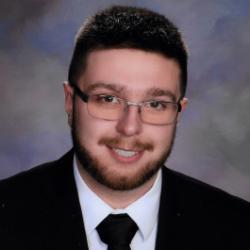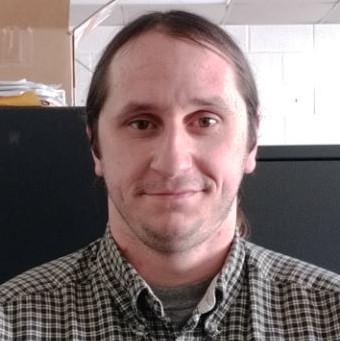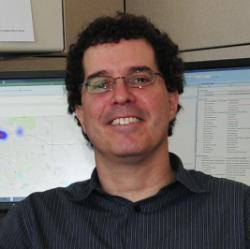Jason Czerwinski ’17 (Geography)
 Member, Town of Monroe Planning Board
Member, Town of Monroe Planning Board
In my current role as Town of Monroe Planning Board member, we are charged with reviewing proposed real estate developments with respect to town policy, code, and our comprehensive plan. Part of that requires looking at something called an Environmental Assessment (EA) or Environmental Impact Statement (EIS), which is a comprehensive study of the effects of a development: sewer, water, traffic, animal populations, etc. My planning classes at SUNY New Paltz exposed me to the relevant state and federal laws and the role of a town’s planning board. I have also learned how to analyze a full-length comprehensive plan and summarize it into a shorter briefing document and presentation.
The next thing we examine with any large proposed development is its site plan. The three Geographic Information Systems (GIS) classes in SUNY New Paltz’s Geography Department are a great way to be introduced to how they are created and mapped. What I learned from those classes is how to locate land in SBL (Section/Block/Lot) format without having to rely on a land records book (which is usually old and dusty and not entirely up to date, unlike its electronic counterpart). SBL format is very common when buying a house or paying your property taxes and in locating vacant land, which is something fairly common for a developer.
All said and done, I took five highly relevant classes: two in planning and three in GIS software. I have also made guest presentations in those classes, detailing the research work I performed and internship opportunities (such as mine in Summer 2017 with the Orange County Planning Department).
A liberal arts education benefited me by exposing me to ways of thinking that I might not have explored if left to my own devices. For instance, in my role with Monroe I frequently draw on concepts I learned in diverse courses such as Geography of Soils, Introduction to Human Services, and Macroeconomics. As a general rule, I have found that the most valuable parts of my education at SUNY New Paltz are broader than how relevant a specific class is to my interests, and instead the opportunity to develop skills such as how to formulate challenges and solutions. In my experience, my liberal arts education prepared me for problem solving, which aligns with what employers are seeking.
January 2018
Alex W. Peimer ’10 (Geography)
 Assistant Professor of Environmental Policy, Department of Geography and Environmental Studies, Northeastern Illinois University
Assistant Professor of Environmental Policy, Department of Geography and Environmental Studies, Northeastern Illinois University
After graduating from New Paltz in 2010 with a B.A. in Geography and a minor in Geology, I went to Kent State University and earned a M.A. in Geography. My M.A. thesis investigated the environmental politics associated with the then-prospective “hydraulic fracturing” form of natural gas production in New York. As a Ph.D. student at the University of Illinois, I continued to research in the field of environmental policy and management from a political ecology perspective, but also included direct measurements of biophysical systems. My dissertation examined the development of stream quality metrics and the eco-geomorphic outcome of a U.S. Clean Water Act Section 404 stream compensation program intended to achieve “no net loss” of the ecological quality of streams and rivers nationally. I have also taught and developed course material for courses in G.I.S., remote sensing, physical geography, international conflict and global environmental development. I graduated with my Ph.D. in August 2016. I am currently an Assistant Professor of Environmental Policy in the Department of Geography and Environmental Studies at Northeastern Illinois University in Chicago.
I would not be in the position I am today if it weren’t for my experience at New Paltz. The Department of Geography at New Paltz exposed me to a wide-range of course topics and encouraged me to practice geography inter-disciplinarily with an open mind. The foundation to many of my methodological and technical skills (G.I.S. mapping, cartography, G.P.S. data collection, geomorphic landscape analysis, discourse analysis) can be traced to individual professors, course assignments and research projects during my B.A. degree program. These skills are the very skills that have put me in line for internships (e.g. with the Illinois EPA), research assistantships (e.g. with the U.S. Army Corps of Engineers), teaching positions (e.g. my first physical geography lab instruction at Kent State), and my current position as an Assistant Professor.
During my time at New Paltz I was given unique opportunities that have led to both my professional and personal development. My senior year I conducted an independent study under close guidance of my advisor. This one-on-one guidance throughout the research and writing process gave me important experience early on in my academic career. I was also given a chance to participate in public outreach. Alongside other professors in the department, I assisted in giving a guided talk of the landscape history of property that was potentially being set aside as conservation land in the Wallkill Valley. I was shown that environmental education is not limited to textbooks and classrooms.
My liberal arts education has had a tremendous impact on my life and my early career development. In life, my exposure to courses across the humanities, arts and sciences has given me appreciation for the need to think through environmental issues from multiple disciplinary perspectives. Rather than seeing environmental problems as purely technical issues, my liberal arts training has taught me to question the source of these problems and how they are dealt with differently across social, economic, geographic and historical contexts. Embedded in almost every social and environmental problem are questions of cultural meaning, value, ethics and aesthetics that are only deeply explored in non-technical coursework. This has benefited my early career development because I have continued the liberal arts tradition by attending inter-disciplinary conferences and workshops, and am now prepared to teach courses from a wide variety of disciplinary approaches. I have also developed important professional relationships with scientists and professionals across multiple disciplines because of my ability to communicate across social and technical lines.
To me, a liberal arts education means to be able to take what has been taught in a wide variety of courses and see how the underlying human sensibilities shape our framing and solving of technical and political issues. From a liberal arts education perspective, it means to not just accept a problem or solution, but to step back and understand the context in which problems are identified and solutions are developed. In the classroom, a liberal arts education means to always be willing to identify threads and relationships between otherwise distant topics.
August 2016
Doug Genzer ’93 (Geography)
 GIS Data Administrator
GIS Data Administrator
The Geography program at SUNY New Paltz engrained in me the basic principles of geography and cartography that I still practice today. I learned about the visualization of data, and how to ensure the message of the map is easily understood by the reader/end user. In the New Paltz Cartography Lab, I learned how to take chances and try new, innovative ways of symbolizing data. I attribute my love of geography and much of the success in my career to my learning experiences and professors at New Paltz.
The Liberal Arts education afforded by SUNY New Paltz has served me well in my career. By taking a diverse course load in art history, philosophy, biology, and environmental sciences, I was exposed to different ideas and skills that have been incorporated into my previous and current job positions. My biology and environmental science class work helped me to get an internship, and then my first job with the U.S. Forest Service.
Later in my career while working for an environmental consulting firm, I combined the science and art lessons that I learned to evolve my map making skills toward producing superior products. This in turn led to a Senior Geographic Information Systems (GIS) Analyst position with the City and County of Denver, where I became an award-winning cartographer.
In my current position as GIS Data Administrator, I manage the day-to-day activities of a team of seven GIS analysts for the City and County of Denver’s Technology Services Enterprise Data Management GIS group. My group provides Enterprise GIS services to all city/county agencies. I provide work planning through Scrum/Agile project management methodologies and train and mentor staff in cartography, data modeling, and geographic analysis. Our team turns city agencies’ project requirements into GIS solutions, such as web mapping applications, hard copy maps, and reports. These products help the city’s leadership to make informed decisions.
April 2016

 Member, Town of Monroe Planning Board
Member, Town of Monroe Planning Board Assistant Professor of Environmental Policy, Department of Geography and Environmental Studies, Northeastern Illinois University
Assistant Professor of Environmental Policy, Department of Geography and Environmental Studies, Northeastern Illinois University GIS Data Administrator
GIS Data Administrator





